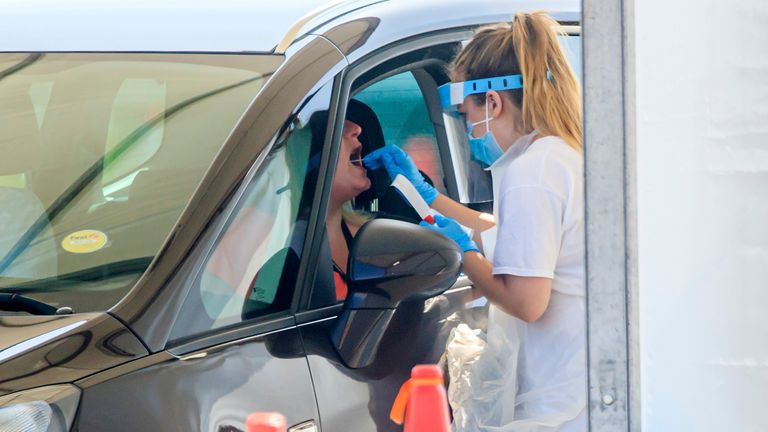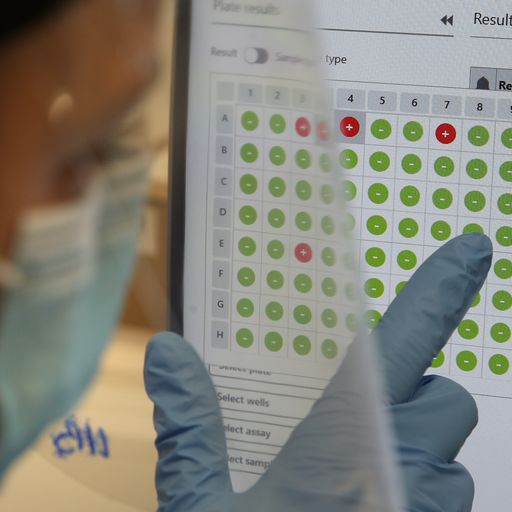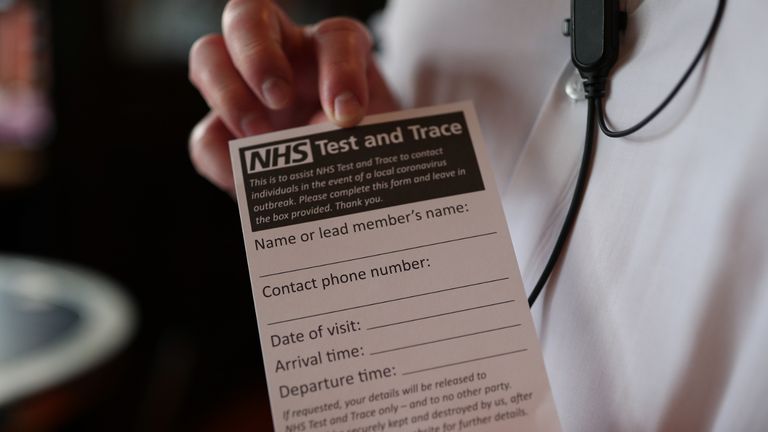Coronavirus: 6,000 contact tracers will be cut in England in the next two weeks
The scheme has been criticised for not tapping into local knowledge enough amid fears it may not stop a second wave.
Tuesday 11 August 2020 07:49, UK
The number of national contact tracers will be cut by 6,000 in the next two weeks with the remaining teams redeployed to local contact tracing groups, the Department of Health has said.
Under the new approach, local authorities and public health teams will have more responsibility to strengthen regional test and trace powers in England.
It comes after criticism that the national system was not tapping into local knowledge.
A report last week warned the UK risked a second wave of coronavirus more than two times as large as the initial outbreak if plans to reopen schools full-time in September went ahead without improvements to the test and trace scheme.
Researchers from UCL and the London School of Hygiene and Tropical Medicine analysed data on how many people were reached by the system.
Between 23 and 29 July, contact tracers reached just under 80% of people who were referred to the system after testing positive for coronavirus, and of those just under 80% provided their recent contacts.
Of the 19,150 people who were identified as recent close contacts of infected people, 72% were reached - down from 76% in the previous week.
NHS Test and Trace will now provide local authorities in England with a dedicated team of contact tracers for local areas. It will mean the numbers of tracers - NHS clinicians and people trained during the pandemic - is cut from 18,000 to 12,000 on 24 August.
The new approach is already being used in the coronavirus hotspots of Blackburn with Darwen, Luton and Leicester.
In the pilot schemes, local authorities have visited people at their homes when national contact tracers have been unable to reach them.
NHS Test and Trace, Public Health England and local authorities will be able to work together to ensure more people are reached, the government said.
Further localised testing is also continuing to be rolled out, with more than 200 mobile testing centres already in operation and over 200 walk-in centres set to open by October.
Labour said the new plans show the test and trace scheme is not as "world-beating" as the government claims.
"A truly effective system would provide all local areas with detailed data sets, ensure people have support to self-isolate if needed, and give local health officials the help and resources they need to lead contact tracing," said shadow health minister Justin Madders.
NHS Test and Trace chair Dido Harding said officials are becoming more effective at tackling the virus as more is learnt about the disease.
"NHS Test and Trace is one of the largest contact tracing and testing systems anywhere in the world, and was built rapidly, drawing on the UK's existing health protection networks, to stop the spread of coronavirus," she said.
"At the height of the pandemic we ensured the system had extra capacity in place to cope with potential peaks in the virus.
"We have always been clear that NHS Test and Trace must be local by default and that we do not operate alone - we work with and through partners across the country."
:: Listen to the Daily podcast on Apple Podcasts, Google Podcasts, Spotify, Spreaker
Councillor James Jamieson, chairman of the Local Government Association, said the announcement is "good news for everyone" and added the knowledge of local authorities would be "vital" in efforts to slow the pandemic.
Keith Neal, emeritus professor in the epidemiology of infectious diseases at the University of Nottingham, said the plans would ensure more people are contacted but he had concerns about local resources.
"The advantage of a national system is that it can divert resources to hotspots. In some places there are very few cases, others have many more, so there is likely to be a capacity issue in some areas," he said.
"A centralised system can divert resources where they are needed more efficiently. Whoever makes contact needs to keep the local PHE team informed of the results.
"The key step is that local Public Health England teams oversee this as local authorities are too small and in some places three or four authorities are within a few miles of each other."







